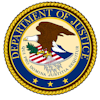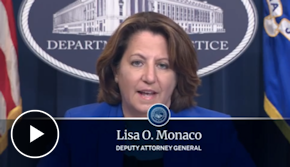The Biden Administration's DOJ & SEC
The Department of Justice & the Securities and Exchange Commission
Detail Their Mission
DOJ Press release, Oct. 28,
2021
DOJ Makes Significant Changes in Corporate Crime Efforts
- Holding Companies &
Officers Accountable
Every LP &
AP leader of a public company needs to read this. DOJ investigations can impact
your officers & board members.
Deputy Attorney General Lisa O. Monaco Gives Keynote Address at ABA's 36th
National Institute on White Collar Crime
 I have three priorities for my time with you. First, I want to describe
three new actions that the
department is taking today
to strengthen the way we respond to corporate crime. Second, I want to look
forward and tell you about some areas we will be studying over the next months,
with an eye to making additional changes to help further invigorate the
department’s efforts to combat corporate crime.
I have three priorities for my time with you. First, I want to describe
three new actions that the
department is taking today
to strengthen the way we respond to corporate crime. Second, I want to look
forward and tell you about some areas we will be studying over the next months,
with an eye to making additional changes to help further invigorate the
department’s efforts to combat corporate crime.
The
first announcement augments our efforts to ensure individual accountability.
To hold individuals
accountable,
prosecutors first need to know the cast of characters involved in any
misconduct. To that end, today I am directing the department to restore prior
guidance making clear that
to be eligible for any
cooperation credit, companies must provide the department with all
non-privileged information
about individuals involved in or responsible for the misconduct at issue. To be
clear, a company
must identify all individuals
involved in the misconduct, regardless of their position, status or seniority.
It
will no longer be sufficient
for companies to limit disclosures to those they assess to be “substantially
involved” in the misconduct. Such distinctions are confusing in practice and
afford companies too much discretion in deciding who should and should not be
disclosed to the government. To aid this assessment, cooperating companies will
now be required to provide the government with all non-privileged information
about individual wrongdoing.

The second change I am announcing today deals with
the issue of a company’s prior
misconduct and how that
affects our decisions about the appropriate corporate resolution.
Today, the department is making clear that all prior misconduct needs to be
evaluated when it comes to decisions about the proper resolution with a company,
whether or not that misconduct is similar to the conduct at issue in a
particular investigation. That record of misconduct speaks directly to a
company’s overall commitment to compliance programs and the appropriate culture
to disincentivize criminal activity.
To that end, today I am issuing new guidance to prosecutors regarding what
historical misconduct
needs to be evaluated when considering corporate resolutions.
This will include an amendment to the Department’s “Principles of Federal
Prosecution of Business Organizations.” Going forward, prosecutors will be
directed to consider the full criminal, civil and regulatory record of any
company when deciding what resolution is appropriate for a company that is the
subject or target of a criminal investigation.
Going forward, prosecutors can and should consider the full range of prior
misconduct, not just a narrower subset of similar misconduct — for instance,
only the past FCPA investigations in an FCPA case, or only the tax offenses in a
Tax Division matter.
&uuid=(email))
The final change I am announcing today deals with the use of corporate monitors.
Stepping back, any resolution with a company involves a significant amount of
trust on the part of the government. Trust that a corporation will commit itself
to improvement, change its corporate culture, and self-police its activities.
But where the basis for that trust is limited or called into question, we have
other options. Independent monitors have long been a tool to encourage and
verify compliance.
In recent years, some have suggested that monitors would be the exception and
not the rule. To the extent that prior Justice Department guidance suggested
that monitorships are disfavored or are the exception, I am rescinding that
guidance. Instead, I am making clear that the department is free to require the
imposition of independent monitors whenever it is appropriate to do so in order
to satisfy our prosecutors that a company is living up to its compliance and
disclosure obligations under the DPA or NPA.
The changes I am announcing today
are only the first steps to reinforce our
commitment to combatting corporate crime.
In addition to the issue of monitorship selection, we have other issues to explore. Let me now preview some
of the other issues we will review and tell you how we’ll go about conducting
that review.
Today I am announcing the formation of the Corporate Crime Advisory Group, which
will be made up of representatives from every part of the department involved in
corporate criminal enforcement. This group will have a broad mandate and will
consult broadly.
I’m sure many of you in the audience are going to get calls from clients over
the next few days with questions about what this all means. So, let me conclude
by giving you the answers — with these five points:
●
Companies need to
actively review
their compliance programs
to ensure they adequately monitor for and remediate misconduct — or else it’s
going to cost them down the line.
●
For clients facing
investigations, as of today, the department
will review their
whole criminal, civil and regulatory record
— not just a sliver of that record.
●
For clients
cooperating with the government,
they need to
identify all individuals involved in the misconduct
— not just those substantially involved — and produce all non-privileged
information about those individuals’ involvement.
●
For clients
negotiating resolutions, there is
no default
presumption against corporate monitors.
That decision about a monitor will be made by the facts and circumstances of
each case.
●
Looking to the
future, this is a start — and not the end —
of this administration’s actions to
better combat corporate crime.
As we review and reassess our approach to corporate criminal enforcement, let me
assure you that we will be in dialogue with those in this audience. We value
your input and views on what are a complex set of issues.
justice.gov
Editor's Note:
Anyone who reports to the audit committee and or has Sarbanes Oxley
responsibilities obviously needs too review this and have a discussion with
in-house legal counsel. As this could have significant consequences.
Over the years we've followed a number of these 'white collar' cases, some of
which being extremely significant, where sizeable
settlements were
reached without an admission of guilt
or criminal wrong-doing and was clearly spelled out that way,
and in a manner to
avoid additional liability.
Twelve days
earlier the SEC's Enforcement Director announces "The start of the SEC's effort
to combat corporate crime."
&uuid=(email))
SEC.gov Press Release, Oct 13, 2021
This is the "Start of this administrations
combating corporate crime."
Remarks at SEC Speaks 2021, Washington D.C.
Gurbir Grewal, Director, Division of Enforcement
Thank you for that introduction and good morning everyone. It’s an honor and
privilege to speak with both my SEC colleagues and so many from the securities
industry and defense bar about a topic that affects all of us: trust.
Many Americans’
trust in our
institutions is faltering.
From Congress to law enforcement to the courts, no sector is immune from this
trend. According to a recent Gallup poll, only a small percentage of Americans
have any significant level of confidence in banks, technology companies, or big
business.
These levels, in
fact, are near historic lows.
While there’s no single cause for this decline when it comes to our financial
institutions, part of it is due to repeated lapses by large businesses,
gatekeepers, and other market participants, coupled with the perception that we—the
regulators—are failing to hold them appropriately accountable,
or worse still, the belief by some that
there are two sets
of rules: one for the big and powerful and another for everyone else.
Each day, however, the Enforcement Division’s staff work tirelessly to enhance
that trust and make clear that
there is only one
set of rules by
prosecuting the bad actors who break them, without fear or favor. Despite the
challenges of a once in a lifetime pandemic, they did so over the last fiscal
year by bringing more standalone enforcement actions than the prior year,
including cases involving auditor misconduct, insider trading, bribery schemes,
and misleading claims surrounding SPAC transactions.
&uuid=(email))
I’m proud of the dedication of our team in Enforcement and believe that by both
continuing these types of proactive enforcement efforts and sharpening our focus
in additional areas, we will enhance Americans’ trust in our financial
institutions. And it’s those additional areas of focus that I want to turn to
next. They include
emphasizing
corporate responsibility, gatekeeper accountability and appropriate remedies,
particularly prophylactic ones.
With respect to
corporate responsibility;
Congress has enacted many laws and the SEC has adopted many rules to ensure that
corporations are being responsible and playing fair. But too often, they ignore
these rules and fail to implement sufficient controls or procedures to ensure
compliance. In some cases, firms are practically inviting fraud or waiting for
misconduct to occur; in others, they are actively covering it up or minimizing
it. All of this serves to undermine public trust and confidence. Enhancing it
will require, among other things, robust enforcement of laws and rules
concerning required disclosures, misuse of nonpublic information, violation of
record-keeping obligations, and obfuscation of evidence from the SEC or other
government agencies.
Gatekeeper
Accountability:
But restoring trust requires more than SEC enforcement actions. We must all work
together to ensure that companies are following the rules. And this leads me to
my second point:
the essential role
that gatekeepers like so many of you play.
When gatekeepers are living up to their obligations, they serve as the first
lines of defense against misconduct. But when they don’t, investors, market
integrity, and public trust all suffer. Encouraging your clients to play in the
grey areas or walk right up to the line creates significant risk. It’s when
companies start testing those lines that problems emerge and rules are broken.
And even if that’s not the case, the public loses faith in institutions that
appear to be trying to get away with as much as they can. That’s why
gatekeepers will
remain a significant focus for the Enforcement Division,
as evidenced by some of our recent actions.
Crafting
Appropriate Remedies;
Finally, in addition to punishing misconduct,
our remedies must
deter it from happening in the first place.
If the public understands that our decisions are motivated by these principles,
it also increases their trust that institutions are playing by the rules and
being held accountable when they do not.
When it comes to accountability,
few things rival
the magnitude of wrongdoers admitting that they broke the law,
and so, in an era of diminished trust, we will, in appropriate circumstances,
be requiring admissions in cases where heightened
accountability and acceptance of responsibility are in the public interest.
Admissions, given their attention-getting nature, also serve as a clarion call
to other market participants to stamp out and self-report the misconduct to the
extent it is occurring in their firm.
You should
expect to see us recommend aggressive use of these
prophylactic tools to protect investors and the marketplace,
and relatedly the public’s trust that all institutions and individuals are
playing by the same rule set. And we’ll take a particularly hard look at whether
we need to deploy these tools if the specific offender is a recidivist. When a
firm repeatedly violates our laws or rules, they should expect that the remedial
relief we seek will take that repeated misconduct into account.
sec.gov